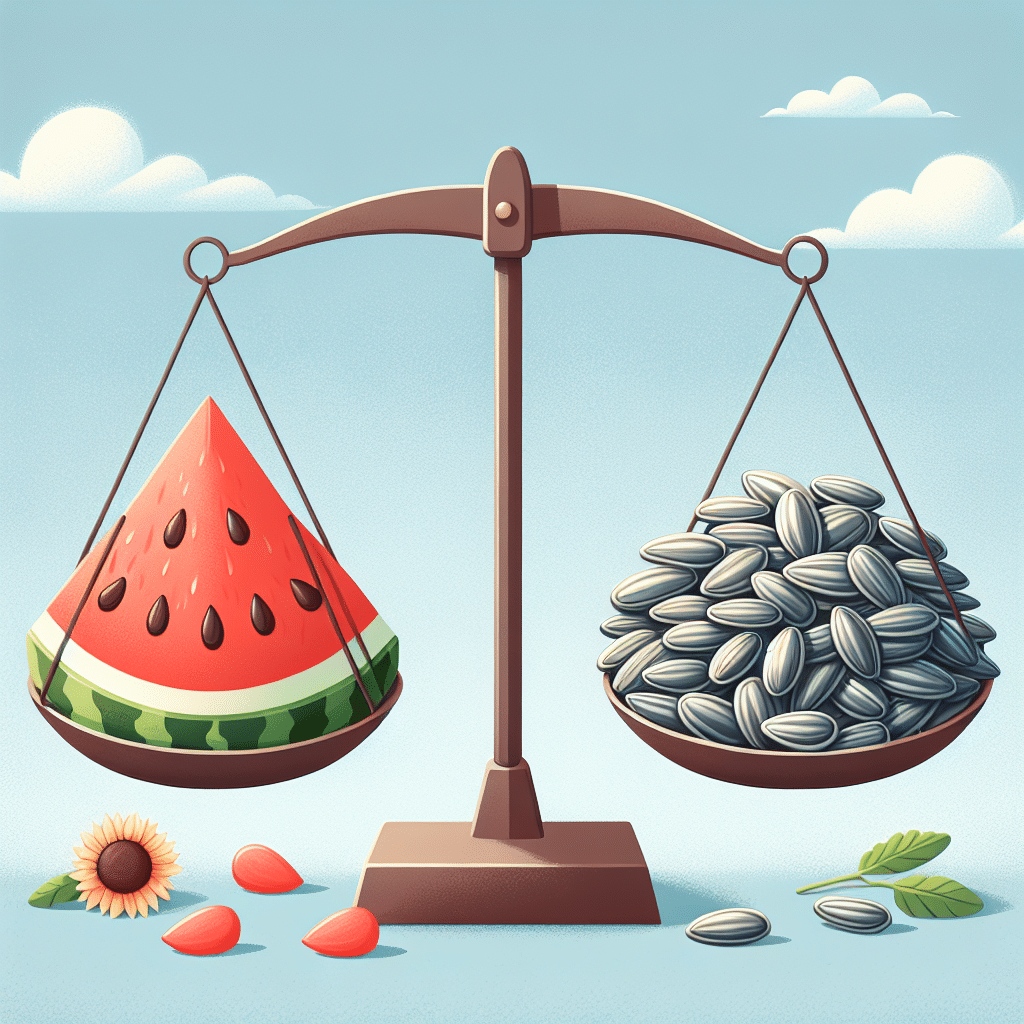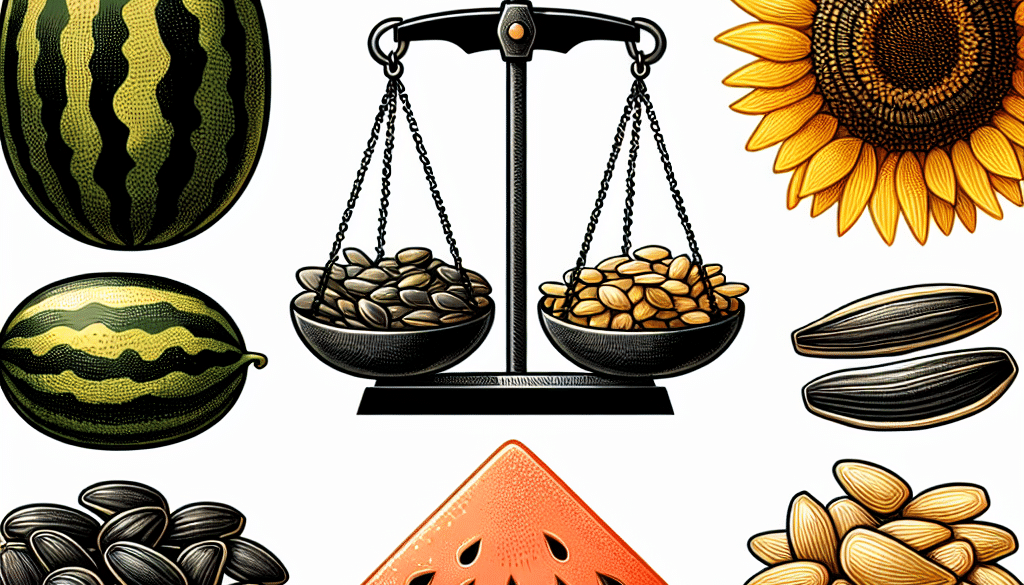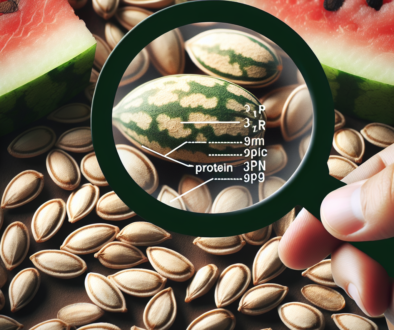Which Is Better Watermelon Seeds Or Sunflower Seeds?
-
Table of Contents
- Watermelon Seeds vs. Sunflower Seeds: A Nutritional Showdown
- Nutritional Profiles of Watermelon and Sunflower Seeds
- Health Benefits of Watermelon and Sunflower Seeds
- Culinary Uses and Versatility
- Environmental and Sustainability Considerations
- Conclusion: Which Seed Reigns Supreme?
- Discover ETprotein’s Premium Seed Proteins
Watermelon Seeds vs. Sunflower Seeds: A Nutritional Showdown

When it comes to snacking, seeds are a powerhouse of nutrition, offering a plethora of health benefits in a tiny package. Among the variety of seeds available, watermelon seeds and sunflower seeds are popular choices. Both are packed with nutrients and can be a healthy part of your diet. But which one is better? In this article, we’ll dive into the nutritional profiles, health benefits, and uses of both watermelon seeds and sunflower seeds to determine which seed might be the superior snack for your health goals.
Nutritional Profiles of Watermelon and Sunflower Seeds
Understanding the nutritional content of watermelon and sunflower seeds is crucial to determining which is better suited for your dietary needs. Here’s a breakdown of what each seed has to offer:
- Watermelon Seeds: Watermelon seeds are low in calories and high in nutrients. They are a good source of protein, magnesium, zinc, and iron. They also contain heart-healthy fats and amino acids that are essential for muscle growth and repair.
- Sunflower Seeds: Sunflower seeds are also nutrient-dense, providing a significant amount of vitamin E, selenium, and antioxidants. They are rich in healthy fats, particularly linoleic acid, which is a type of polyunsaturated fat.
Both seeds offer different nutritional benefits, making them unique in their own right. Watermelon seeds are particularly beneficial for those looking to increase their protein intake, while sunflower seeds are excellent for those seeking to boost their vitamin E and selenium levels.
Health Benefits of Watermelon and Sunflower Seeds
Both watermelon and sunflower seeds have impressive health benefits. Let’s explore some of the advantages of incorporating these seeds into your diet:
- Heart Health: The magnesium in watermelon seeds helps regulate blood pressure and supports heart health. Sunflower seeds, with their high vitamin E content, can prevent cardiovascular disease by reducing inflammation and oxidative stress.
- Immune Support: Zinc in watermelon seeds is vital for immune function. Sunflower seeds contain selenium, which also plays a crucial role in maintaining a healthy immune system.
- Weight Management: Both seeds are high in fiber and protein, which can help you feel full longer and reduce overall calorie intake, aiding in weight management.
- Bone Health: Magnesium in watermelon seeds is essential for bone formation and maintenance. Sunflower seeds offer magnesium as well, along with copper, which is important for bone strength.
- Diabetes: The healthy fats in both seeds can help regulate blood sugar levels, making them a smart choice for individuals with diabetes or those at risk.
While both seeds offer numerous health benefits, the choice between them may come down to specific nutritional needs or personal preference.
Culinary Uses and Versatility
Both watermelon and sunflower seeds can be enjoyed in a variety of ways, making them versatile additions to any diet:
- Watermelon Seeds: These can be roasted and salted for a crunchy snack, ground into a flour for baking, or sprouted to enhance their nutrient availability.
- Sunflower Seeds: Sunflower seeds are commonly eaten as a snack, added to salads and baked goods, or used to make sunflower butter, a popular alternative to peanut butter.
The versatility of these seeds means they can easily be incorporated into meals and snacks throughout the day, providing a nutritional boost to your diet.
Environmental and Sustainability Considerations
For those concerned with environmental impact and sustainability, it’s worth considering the ecological footprint of watermelon and sunflower seeds:
- Watermelon Seeds: Watermelon cultivation requires a significant amount of water, which can be a concern in areas with water scarcity. However, using the seeds helps reduce waste and makes the most of the entire fruit.
- Sunflower Seeds: Sunflowers are hardy plants that can grow in a variety of climates and soil types. They have a relatively low water requirement compared to other crops, making them a more sustainable choice in certain regions.
Choosing seeds based on sustainability can be a complex decision that depends on various factors, including local climate and agricultural practices.
Conclusion: Which Seed Reigns Supreme?
In the debate between watermelon seeds and sunflower seeds, there is no clear winner. Both seeds offer unique nutritional benefits and can be part of a healthy diet. The choice may come down to individual health goals, dietary restrictions, or even taste preference. Whether you’re looking for a protein boost, an antioxidant-rich snack, or a sustainable food option, both watermelon and sunflower seeds have something valuable to offer.
Ultimately, the best approach may be to include a variety of seeds in your diet to take advantage of the diverse range of nutrients they provide. By doing so, you can enjoy the health benefits of both watermelon and sunflower seeds, along with other nutritious seeds like chia, flax, and pumpkin seeds.
Discover ETprotein’s Premium Seed Proteins
If you’re looking to incorporate high-quality seed proteins into your diet, ETprotein offers a range of organic and non-GMO protein products. Their watermelon seed protein and sunflower seed protein are excellent choices for those seeking plant-based protein options. With a neutral taste and allergen-free attributes, these proteins are perfect for shakes, smoothies, and a variety of recipes.
ETprotein’s commitment to purity and quality ensures that you’re getting the best product for your nutritional needs. Whether you’re a fitness enthusiast, following a plant-based diet, or simply looking to improve your overall health, ETprotein’s seed proteins are a great addition to your dietary regimen.
About ETprotein:
ETprotein, a reputable protein and L-(+)-Ergothioneine (EGT) Chinese factory manufacturer and supplier, is renowned for producing, stocking, exporting, and delivering the highest quality organic bulk vegan proteins and L-(+)-Ergothioneine. They include Organic rice protein, clear rice protein, pea protein, clear pea protein, watermelon seed protein, pumpkin seed protein, sunflower seed protein, mung bean protein, peanut protein, and L-(+)-Ergothioneine EGT Pharmaceutical grade, L-(+)-Ergothioneine EGT food grade, L-(+)-Ergothioneine EGT cosmetic grade, L-(+)-Ergothioneine EGT reference grade and L-(+)-Ergothioneine EGT standard. Their offerings, characterized by a neutral taste, non-GMO, allergen-free attributes, with L-(+)-Ergothioneine purity over 98%, 99%, cater to a diverse range of industries. They serve nutraceutical, pharmaceutical, cosmeceutical, veterinary, as well as food and beverage finished product distributors, traders, and manufacturers across Europe, USA, Canada, Australia, Thailand, Japan, Korea, Brazil, and Chile, among others.
ETprotein specialization includes exporting and delivering tailor-made protein powder and finished nutritional supplements. Their extensive product range covers sectors like Food and Beverage, Sports Nutrition, Weight Management, Dietary Supplements, Health and Wellness Products, and Infant Formula, ensuring comprehensive solutions to meet all your protein needs.
As a trusted company by leading global food and beverage brands and Fortune 500 companies, ETprotein reinforces China’s reputation in the global arena. For more information or to sample their products, please contact them and email sales(at)ETprotein.com today.












